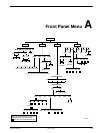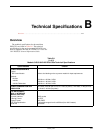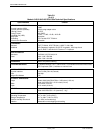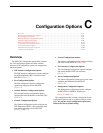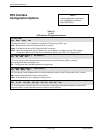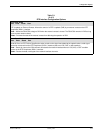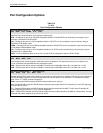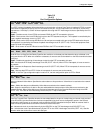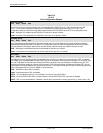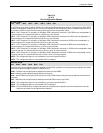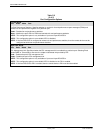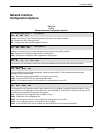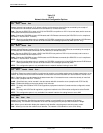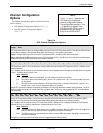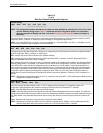
Configuration Options
C-53160-A2-GB21-50 January 1997
Table C-2
(2 of 5)
Port Configuration Options
Port LB: Disab (Factory 1) Both (Factory 2)
Next Disab DTLB DCLB Both Prev
Port (DTE) Initiated Loopbacks. Allows the initiation and termination of a local Data Terminal Loopback (DTLB) or remote
Data Channel Loopback (DCLB) by the DTE connected to this port. (DTLB is equivalent to a V.54 loop 3, and DCLB is
equivalent to a V.54 loop 2.) Control of these loopbacks is through the DTE interchange circuits as specified by the V.54
standard.
Disab – Disables control of local DTLBs and remote DCLBs by the DTE connected to this port.
DTLB – Gives control of the local DTLBs for this port to the DTE attached to this port. This loopback is controlled by the
Local Loopback interchange circuit LL (CCITT 141).
DCLB – Gives control of the remote DCLBs for the far-end port connected to this port to the DTE attached to this port.
This loopback is controlled by the Remote Loopback interchange circuit RL (CCITT 140). The far-end equipment must
support in-band V.54 loopbacks.
Both – Gives control of local DTLBs and remote DCLBs to the DTE connected to this port.
All Ones: Both
Next Disab DTR RTS Both Prev
Send All Ones on Data Port Not Ready. Specifies the conditions on the data port that determine when valid data is not
being sent from the DTE. When this condition is detected, all ones are sent to the network on the DS0 channels allocated
to the port.
Disab – Disables the monitoring of interchange circuits from the DTE connected to this port.
DTR – Monitors the DTE Ready interchange circuit CD (CCITT 108/1/2). When DTR is interrupted, all ones are sent to
the network.
RTS – Monitors the Request-to-Send interchange circuit CA (CCITT 105). When RTS is interrupted, all ones are sent to
the network.
Both – Monitors both DTR and RTS. If either is interrupted, all ones are sent to the network.
NOTE: If the Port Type configuration option is set to X.21, set this configuration option to RTS or Disab.
Rcv Yellow: Halt
Next None Halt Prev
Action on Network Yellow Alarm. Specifies the action taken on this port when a Yellow Alarm is received on the network
interface.
None – Makes the data port unaffected by Yellow Alarms received on the network interface.
Halt – Stops the transmission of data on the port and disables the data port when Yellow Alarms are received on the
network interface. When Yellow Alarms are received, all ones are sent on the Received Data interchange circuit BB
(CCITT 104). The Clear-to-Send interchange circuit CB (CCITT 106) is interrupted.
Tx Clock: Int
Next Int Ext Prev
Data Port Transmit Clock. Specifies whether the transmitted data for the port is clocked using an internal clock provided
by the DSU/CSU (synchronized to the clock source specified by the clock source configuration option in the General
configuration option group) or an external clock provided by the DTE connected to the port. When an external clock is
used, it must be synchronized to the same clock source as the DSU/CSU.
Int – Indicates the clock is provided internally by the DSU/CSU on the TXC interchange circuit DB (CCITT 114).
Ext – Indicates the clock is provided externally by the DTE on the XTXC interchange circuit DA (CCITT 113). Use this
selection when the clock source is set to this data port.



